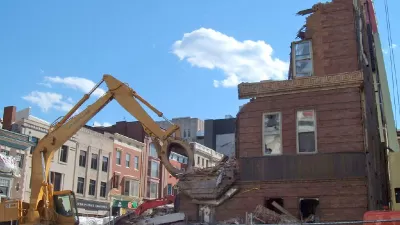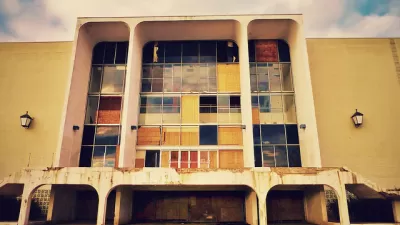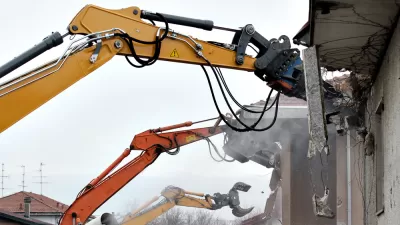Saddled with thousands of vacant buildings, and little hope of recovering lost population, cities such as Baltimore, Buffalo, and Cleveland are pursuing large-scale demolitions. Shrinking cities are changing the very practice of urban planning.

"Large-scale destruction is well known in Detroit, but it is also underway in Baltimore, Philadelphia, Cleveland, Cincinnati, Buffalo and others at a total cost of more than $250 million," writes Timothy Williams. "Officials are tearing down tens of thousands of vacant buildings, many habitable, as they seek to stimulate economic growth, reduce crime and blight, and increase environmental sustainability."
"The continuing struggles of former manufacturing centers have fundamentally altered urban planning, traditionally a discipline based on growth and expansion," he continues. "Today, it is also about disinvestment patterns to help determine which depopulated neighborhoods are worth saving; what blocks should be torn down and rebuilt; and based on economic activity, transportation options, infrastructure and population density, where people might best be relocated. Some even focus on returning abandoned urban areas into forests and meadows."
FULL STORY: Blighted Cities Prefer Razing to Rebuilding

Maui's Vacation Rental Debate Turns Ugly
Verbal attacks, misinformation campaigns and fistfights plague a high-stakes debate to convert thousands of vacation rentals into long-term housing.

Planetizen Federal Action Tracker
A weekly monitor of how Trump’s orders and actions are impacting planners and planning in America.

In Urban Planning, AI Prompting Could be the New Design Thinking
Creativity has long been key to great urban design. What if we see AI as our new creative partner?

King County Supportive Housing Program Offers Hope for Unhoused Residents
The county is taking a ‘Housing First’ approach that prioritizes getting people into housing, then offering wraparound supportive services.

Researchers Use AI to Get Clearer Picture of US Housing
Analysts are using artificial intelligence to supercharge their research by allowing them to comb through data faster. Though these AI tools can be error prone, they save time and housing researchers are optimistic about the future.

Making Shared Micromobility More Inclusive
Cities and shared mobility system operators can do more to include people with disabilities in planning and operations, per a new report.
Urban Design for Planners 1: Software Tools
This six-course series explores essential urban design concepts using open source software and equips planners with the tools they need to participate fully in the urban design process.
Planning for Universal Design
Learn the tools for implementing Universal Design in planning regulations.
planning NEXT
Appalachian Highlands Housing Partners
Mpact (founded as Rail~Volution)
City of Camden Redevelopment Agency
City of Astoria
City of Portland
City of Laramie





























